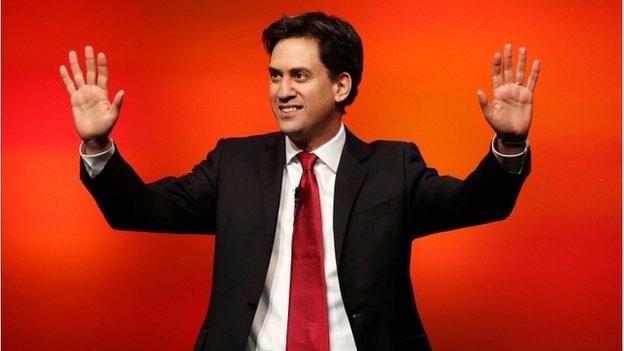Labour tries to blend principle and pragmatism
- Published

Ed Miliband was in Scotland to address the Scottish Labour conference
Regarding this business of more powers for Holyrood - and Labour's offer thereon. At play here is both external and internal politics.
Internal, first. In terms of assuaging dissent and projecting unity, this has been deftly handled by Labour: by Johann Lamont, in close consultation with Ed Miliband; by leading MPs; by the party's devolution commission.
A year ago, Scottish Labour was palpably divided - with sundry MPs criticising a proposal to devolve the whole of income tax as tantamount to independence by the back door. This year in Perth the revised plan was endorsed by the conference unanimously.
Now you might say - critics are already saying - that this is because the scheme is limited by comparison with the original thinking. Only a proportion of income tax. No devolution of Air Passenger Duty.
But, equally, you might argue - Team Lamont are already arguing - that the second version blends principle and pragmatism: that this is what Scotland needs, that this is what the Union requires.
Either way, the leadership has prevailed over internal critics by a combination of concessions, discussion and persuasion.
Social justice
The argument today - from Ed Miliband, from Anas Sarwar - was that these extra powers for Holyrood would be matched by a restatement of the UK's function in enabling social justice by redistributing resources.
External, now. What happens next, now that the offer is out there? Will there be a single, united pro-Union package? Maybe. However, consider. Perhaps it is the inevitable atmosphere of conference, but the speeches today resonated as a Labour offer, predicated upon a Labour manifesto and a Labour UK government.
Does that matter? Yes, to the extent that it permits supporters of independence to argue that the advocates of Union are failing to present a coherent explanation of what, precisely, a No vote would mean.
In response, supporters of the Union say that there is a range of opinions within the Yes camp on issues like the currency. They say further that there is a clear direction of travel - towards more tax powers - on the Union side.
Then the wider external debate. How will the Labour offer - or other pro-Union offers - measure up against independence? That is, of course, the nub of the referendum debate as it has developed. That is what the people of Scotland will decide.
Commission report
Couple of question marks chucked in Labour's direction today. I attempted to address both of these in interviews today with Labour leaders, Miliband and Lamont.
How, I asked Ed Miliband, does the 15p tax power for Holyrood square with his plans for a 10p starting tax rate? His answer was that, for the starting rate, it would in effect be "up to 15p". In short, MSPs could, if they chose, reduce the starting rate to zero provided that reduction was carried through the other bands.
Why, I asked, was this not included in the Commission report? Was this being made up on the hoof? Absolutely not, I was told. The Commission report dealt with existing tax bands: that could be adapted in the event of a change from Westminster, such as a 10p starting rate.
I asked Johann Lamont about Labour's other Commission, that on public services. Would she commit to protect universal services such as free higher education; free prescriptions; and free personal care?
Without giving details, Ms Lamont spoke of the need to balance service provision to the public with fair distribution and with limited resources. Have a look at the full webcast interview online.
To return, finally, to the internal verdict. Labour believes that it has arrived at a place which will appeal to the voters with a blend of enhanced Holyrood powers and a reassertion of the objective of social justice, facilitated by the broader tax base of the UK.
Supporters of independence say the Labour offer is feeble - and that social justice can be obtained by a Scottish government elected by Scottish voters.
Your referendum, your choice.